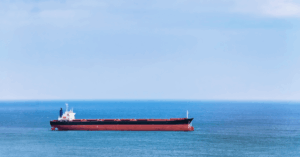
Auckland’s First Fully Electric Passenger Ferry Hits The Water
June 12, 2025
South Korean Ship Rescues 23 Sailors From Sinking Vessel In Indian Ocean
June 13, 2025

A Chinese ship captain has been sentenced to three years in prison in Taiwan for intentionally damaging a vital undersea telecommunications cable connecting the main island of Taiwan to the Penghu archipelago in the Taiwan Strait.
The Tainan District Court issued the verdict on June 12, marking the first time Taiwan has convicted a seafarer in a case involving undersea cable sabotage.
Captain Wang was in charge of Hong Tai 58, a Togolese-registered cargo vessel. In February 2025, the ship was found anchored off Taiwan’s southern coast for several days.
Taiwan’s coast guard gave multiple warnings instructing the vessel to leave the restricted area. Shortly after the vessel sailed away in the early hours of February 25, one of the domestic cables was found severed.
Authorities later confirmed that the ship had damaged Chunghwa Telecom’s No. 3 cable, which links Taiwan to the outlying Penghu islands. Taiwan’s coast guard quickly intercepted and escorted Hong Tai 58 back to port for investigation.
All eight crew members, including Chinese nationals were detained, but only Wang faced formal charges. The remaining crew were sent back to China because there wasn’t enough evidence to charge them.
During the trial, Wang initially denied responsibility but later admitted he “might have broken the cable.” He said the ship had experienced rough sea conditions and he had instructed the crew to drop anchor without realising they were in a cable protection zone.
However, prosecutors said that Wang was aware of the cable’s location, as it was clearly shown on the ship’s electronic charts.
The court concluded that Wang had ordered the anchor to be dropped in a no-anchor zone, despite knowing the risks. According to the court’s statement, the anchor’s claw did not embed into the seabed, causing the ship to drift.
The dragging anchor eventually cut through the cable, completely severing it. The damage disrupted telecommunications and internet services between Taiwan and the Penghu Islands.
Taiwan’s Chunghwa Telecom spent more than NT$17 million (around US$578,000) to repair the cable. An additional NT$1.8 million was spent on shipping agency fees during the recovery process.
The court called Wang’s actions deliberate and said the impact on public infrastructure and society was “enormous,” adding that his punishment serves as a warning to others.
Prosecutors also pointed out some suspicious things about the ship and its operations. The Hong Tai 58 had only carried cargo once in the past year, but it continued to operate in the Taiwan Strait
The vessel had also been known to operate under several different names, and Wang refused to disclose information about the ship’s actual owner, whose identity remains unknown.
Taiwanese officials, including Hsu Shu Han, the lead prosecutor in the case, said the vessel appeared highly suspicious, especially considering its poor condition and lack of clear ownership. Hsu pointed out that the ship had been among a group of 52 China-linked vessels Taiwan had been monitoring for potential threats.
These vessels, while appearing foreign on paper, were suspected of Chinese ownership and operated under flags of convenience from countries such as Togo, Mongolia, Sierra Leone, Cameroon, and Tanzania.
Coast Guard investigators said the ship didn’t move like it normally would while anchored. Usually, anchored ships move in a circular pattern. But Hong Tai 58 dragged its anchor in a zigzag path, which matched the direction and location of the damaged cable. They also found signs of external force at the damage site, suggesting the cable was deliberately dragged.
Between 2019 and 2023, Taiwan reported 36 cases of undersea cable damage caused by outside forces. In 2025 alone, five such incidents have already occurred, compared to three each in 2024 and 2023. Many of these cases have raised concerns about possible foreign interference, especially from China.
In January this year, Taiwan accused another Chinese-owned ship of damaging a cable near the island’s northern coast. The ship’s owner denied any wrongdoing, but the incident contributed to growing fears over sabotage.
Taiwanese authorities have often warned that China might be using such actions as part of “grey zone” tactics. However, China has rejected these claims, calling the cable damage reports exaggerated and saying they were just regular maritime accidents.
Although there was no direct proof linking Wang or his crew to the Chinese government, Taiwanese prosecutors said the pattern of actions by China-linked ships needed more investigation. Wang’s phone records showed no ties to any government agency, but the ship’s suspicious actions and the deliberate cable cut were enough for a court to convict him.
Officials from Taiwan’s Ministry of Digital Affairs warned that attacks on undersea cables could threaten national security. Deputy Minister Herming Chiueh told BBC Chinese that some experts believe a major global conflict, like a world war, could even begin with cable attacks. He added that the Ministry’s top priority is to respond quickly to such incidents.
References: BBC, channelnewsasia
Source: Maritime Shipping News


